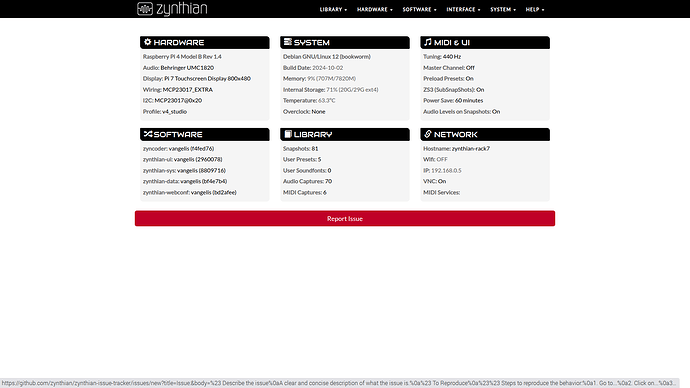It’s the way the project developed from the start, so it’s an approach that spirals round the outer growing surface of zynthian, specific interests and a rigourous PR system ensures that what gets done gets bedded in.
webconf reports are the best place to report quirks, of any nature. . .
But here’s the long form answer.
It’s simply a success problem of what has worked up to now. Please don’t take this as an excuse or an attempt to divert, it’s really not that, just an observation with some expectation involved.
Much development has taken place on audio flow within the guts of the system and the addition of plugins has become both possible and apparent. LV2 appears to be our defacto structure and we want these components to be as standard as possible, so we wish to rigorously define the development path so this core element can propagate throu the zynthian world as easily as possible.
And then document it heavily. That’s my drive here. and I can indulge as little or as much as I want.
As can anyone else. I really like collaborative approaches to problems but as someone who is retired, I have several interests and I try to overlap them so that one can feed others.
I play with mechancial clocks more than zynthians at the moment, but I apply what I learn to both.
Outside of Jofe we have no control over where the development takes place, and obvious none ,really, with Jofe. So at the cutting edge we tend to surf on the current wave, trying to ensure by discussion, ribbing, and bowls of soup quite what get’s addressed next.
I’ve been trying to code and document lv2 & ctrldev components for some time now for various projects, and to aid that wrote the Developers documentation section on the premise that we would have an increasing number of heavily musically inclined users with a desire to do something ‘cody’. The odds of these people having involved themselves in Code, previously is low. So we wrote a lot of instructions to get them to understand the process that feed the developer pipeline most effectively.
It may make people install vsc, but if they’ve read carefully, they wil also be ablse to submit a Bug report or Feature request, so that’s a good thing!
The issue with quirks eta l, is finding them. Many of us have built and maintained large code monoliths and much else besides, so we know how it’s done, but we don’t have the pressures that commercial development teams do. The desire to release version 2.0 for the next trade show in Las Vegas or were ever is not as imperative, so we get a certain amount of features go wizzing by but essential bits in the code base get made solid. It is nothing more than a JACK environment with a bit of MIDI manipulation at the edges after all. . .
The other side of this is quite when is something ‘Finished’ ? I need a 50Hz notch filter to clean up hum pick up on a Microphone listening to a clock. This isn’t a zynthian project, but it’s, perhaps, something that it’s omission could allow the LV2 collection of Zynthian to be described as Unfinished…?
As a said at the beginning development tends to move cyclically around the outer edge, and passes over a similar topic at a time set by that circling, which, as the project grows, get s longer and longer, unless we recruit more developers….
Which if the gibhub fork statistics are anything to go by, is happening.
So for all of us, the best thing we can do is use, and report because our very success, and there certainly has been some, throws up more problems. I’ve found success problems far more involved than failure. Failure code just dies away. Successes open up till the questions, in a flash, change from an incredulous “ooooh it can do that…?” to a scornful “What you mean it can’t do that …?”
We collect quirks and the report section at the bottom of the wecconf page is a good place to put them. IAnd I rather enjoy doing semi literate calls to arms!!
It’s good here ain’t it…?
Nurse!!,
Nurse !!!?!!
wyleu feel tired. . . ,
wyleu want lie down. . . ,
The syringe…?
Thank you Nurse . . ..
Wyleu just pawn in game of life . . .
Wyleu lie down now . . .
